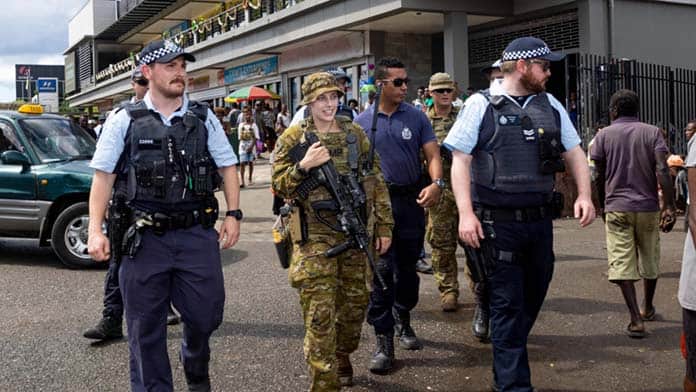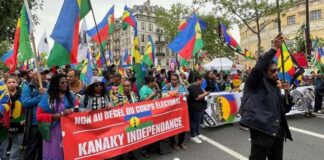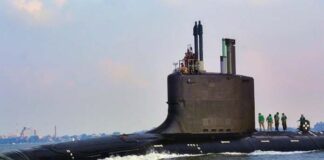The Australian government’s record in the south Pacific shows it is a bully and a thief that wants to maintain its own domination of the region argues James Supple
As election day neared, the Liberals’ desperation saw them resort to ever more ridiculous scaremongering about the threat from China. Former Defence Minister Peter Dutton claimed the presence of a Chinese spy ship off the coast of WA was an “act of aggression”. Yet six months ago Scott Morrison was telling us such ships “have a right to be there” under international law.
Labor, however, has echoed their attitude to China, even saying that it “shares concerns” about the spy ship. Anthony Albanese has constantly blamed China for becoming “more aggressive in the region”.
It too considers any Chinese government presence in the South Pacific as an attempt to militarise the region and a threat.
Yet the Australian government is doing exactly the same thing through its own military buildup, including the plans to acquire nuclear subs at a cost of $170 billion—a move that Labor has appallingly given its full support. As journalist Peter Hartcher reported this is, “about Australia acquiring the power to pose a direct threat to China’s forces and the Chinese mainland” through the capacity to bomb them with cruise missiles.
The US and China are already locked in a fierce and dangerous rivalry. The Australian government is feeding the conflict through encouraging a larger US military presence locally. Australia already hosts US spy bases like Pine Gap. It has agreed to increase the 2500 US troops that already rotate through Darwin, allow deployments of US warplanes, as well as increase the visits of US warships.
Some claim this is about defending democracy against the authoritarianism and aggression of the Chinese government. There is no doubt about the repressive nature of the Chinese regime.
But the actions overseas of Western powers including Australia are every bit as anti-democratic and imperialist.
The Australian government gave Indonesia its support for their invasion of East Timor in 1975, and was the only country to recognise its annexation. At least 105,000 civilians were killed during the brutal 25-year occupation through violence or starvation. Australia continues to oppose independence for West Papua, where Indonesia is carrying out a slow motion genocide. Australia directly trains Indonesian “anti-terrorist” squad Detachment 88 which has carried out torture and extra-judicial killings against independence supporters there.
The Australian government has also backed war criminals like those in the Sri Lankan government. It welcomed then President Mahinda Rajapaksa to Australia for a Commonwealth Heads of Government Meeting just two years after he presided over war crimes including the killing of tens of thousands of Tamil civilians.
Australia did all it could to stop Tamil refugees from getting here, gifting patrol boats, drones and tracking equipment to the Sri Lankan government to intercept boats.
And Australia has backed up US barbarism worldwide, joining the invasion of Iraq, which caused the deaths of at least a million civilians, as well as sending troops and encouraging the US to escalate the Vietnam War.
Bully in the Pacific
Australia’s actions in the local region are those of a bully and an exploiter. Australia is the military and economic superpower of the south Pacific. The economy of the largest of the Pacific island nations, Papua New Guinea, is just 1.5 per cent the size.
The Australian government says it is part of one “Pacific family” with the island states of the southwest Pacific. But Australia’s actions are those of an imperialist power hell bent on securing its own profits and strategic interests.
The negotiations over the Timor Gap oil and gas are a glaring example.
Australia was ruthless in its efforts to grab revenue for itself and to promote the interests of Australian mining company Woodside. In 2002 it bullied the newly independent Timor-Leste, one of the poorest countries in the world, into signing a treaty that handed Woodside billions of dollars worth of helium in the Bayu-Undan field for nothing.
It then insisted on taking half of the tax revenue from the Greater Sunrise field that sits in the ocean between the two countries, despite it being three times further from Australia’s coast.
It even bugged Timor-Leste government offices to spy on its negotiators. Australia only agreed to give Timor a larger share when this illegal action was discovered and it was taken to an international court. Australia still pocketed $5 billion that should have gone to Timor-Leste in the time it took to finalise the agreement.
This imperialism serves the interests of corporations and the rich. All over the region the Australian government promotes the interests of Australian companies and rich investors at the expense of the local population—just as it backs them against unions and the working class at home.
Australia ruled Papua New Guinea as a brutal colonial power until 1975.
Australian companies dominate its economy, with almost $17 billion invested there. Mining companies exploiting its wealth in oil and gas, copper and gold have refused to allow the local population to benefit, avoiding tax in order to boost their profits.
The St Barbara mining company runs the Simberi gold mine, one of the largest in the world. Between 2016 and 2020 it made $427 million profit and paid just 14 per cent tax.
The PNG government expected a massive gas development opened in 2014 by Exxon-Mobil and Australian company Santos to deliver $22 billion in revenue over 25 years. But concessions the companies demanded have cut the expected tax in half.
A World Bank report found the companies had constructed, “a complex web of exemptions and allowances that effectively mean that little revenue is received by government and landowners”.
Australian mining companies have also trashed the local environment, devastating the livelihoods of villagers who live off subsistence farming.
BHP Billiton’s Ok Tedi mine pumped toxic mining waste directly into surrounding rivers for decades between 1984 and 2013. It was one of the world’s biggest ever environmental disasters, polluting 1000 kilometres of river and destroying nearby villages, agriculture and fisheries.
Newcrest’s gold mine on Lihir Island simply pumps its waste into the sea.
Rio Tinto’s abandoned Bougainville mine is still poisoning the island 30 years after it was shut. The Australian government poured $250 million in arms and funding into the PNG military to support a war against the local population, who rose up in opposition to the mine.
But more important to the Australian government than direct profit-making opportunities are its strategic and military interests in the local region.
Australia is heavily reliant on international trade, which makes protecting shipping routes vital. Australian companies rely on this to make their profits, such as mining exports like iron ore and coal that need to get to international markets.
As a result it wants to ensure its own control in the island states of the south Pacific, and exclude competitors. The presence of any potentially hostile power, like China, is viewed as an outrage.
Aid money is one tool it uses to try to win favour among Pacific governments in order to get its way. The Australian money and expertise it distributes are trifles for such a large economy. But it is also quite capable of resorting to threats—as it has over the Solomon Islands.
When it thinks its core interests are at stake the Australian government is not prepared to give its “friends” in the Pacific one inch of compromise.
Solomon Islands Prime Minister Manasseh Sogavare has tried to reassure the government he does not want a Chinese base there, following the signing of a security deal with China.
But Scott Morrison declared publicly that such a development would be a “red line” for Australia anyway. This is exactly the same language that Putin used before his invasion of Ukraine. Such words carry the threat of Australian military action.
A high level US delegation that visited the Solomons following the deal also refused to rule out using military force if China established a military presence there. Daniel Kritenbrink, assistant secretary of state for East Asian and Pacific Affairs, told the media, “we also wanted to let them know that if steps were taken to establish a de facto permanent military presence, power projection capabilities, or a military installation, then… we would very naturally respond”.
So Solomons’ Prime Minister Manasseh Sogavare was not exaggerating when he declared that, “we are threatened with invasion”. His country had been “insulted”, he said, “treated as kindergarten students” and faced with a “continual demonstration of lack of trust”.
Australia’s refusal to act on climate change is another telling example. The government sees this as a threat to the billions in profits made exporting fossil fuels.
This has been a major source of anger in the Pacific, where islands like Tuvalu and Kiribati face complete disappearance.
Fiji’s Prime Minister Frank Bainimarama called Scott Morrison’s behaviour at the last in person Pacific Islands Forum in 2019, “very insulting and condescending”.
Morrison simply demanded that other Pacific leaders sign on to Australian policies, reminding them how much foreign aid Australia gives them. Refusing to accept mentions of climate change in the leaders’ statement, Australia insisted on the removal of the goal of limiting warming to 1.5 degrees (already contained in the Paris Agreement), mentions of coal, or setting a plan to achieve net zero emissions by 2050.
The future of entire nations in the Pacific is at threat—yet the Australian government’s response is cold indifference. Australia is not a friend in the Pacific—it is a ruthless and bullying imperialist.
The only people who benefit from the Australian government’s actions are the corporations and the rich plundering the region for profit. Ordinary people have no interest in helping them further fatten their pockets.
We need to oppose our own government’s militarism and its efforts to bully and dominate the local region. Australia should not be feeding the game of imperialist competition between China and the US. We need to build a movement against militarism and war, and oppose the drive for exploitation and profit that produces this imperialism.






